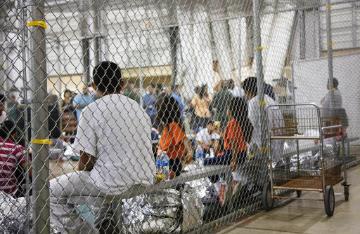
Undocumented immigrants in custody. (AP Photo/Uncredited)
Joan Harrington is the assistant director of Social Sector Ethics at the Markkula Center for Applied Ethics. Views are her own.
Of the 2,654 children separated from their parents under the family separation policy, 416 children continue to be held in government-funded shelters. In addition, 12,800 children who crossed the border without their parents are being held in such shelters, according to recent reports.
Nonprofit organizations run many of these shelters and receive substantial government funding to house the children. What are the ethics of this? In a recent article about the role of architects in response to the family separation policy, the author told the story of Noguchi, a Japanese-American sculptor and designer who voluntarily joined a Japanese internment camp in the hope of starting an arts and crafts program and improving the humanity of the camp he joined. His efforts failed. The author of the article asked of her fellow architects:
What is the role of a socially conscious architect in this crisis? In theory, at least, architects could improve conditions by designing (or lobbying the government en masse to insist on) facilities with sufficient space, natural light, good ventilation, access to the outdoors, and some degree of privacy for individuals and families.
But would efforts at improving conditions in detention facilities under ICE and other agencies, from the outside, be as futile as Noguchi’s were from the inside? And would they mean capitulating to an unethical system?
The same should be asked of nonprofits.
There are many nonprofits involved in housing immigrant children detained by the government, including religious organizations. Like Noguchi, they likely view themselves as trying to do good and responding to a humanitarian crisis. It is worth reflecting on this theory.
There is a lot of money involved in housing these children. Southwest Key, a nonprofit providing shelter and other services to immigrant children in federal custody, has received $955 million in federal contracts since 2015. The chief executive has a total compensation package of $1.47 million for 2018, with more than $889,000 in salary and $566,000 in retirement benefits—rich payment for the head of even the most complex of nonprofits.
Southwest Key issued a statement opposing the family separation policy and noted that family reunification is part of their work. Is that enough? Should these organizations, that choose to participate in the system and daily see the impact of the government policies on these children, be aggressively advocating for change to immigration policies? Does the fact that they receive money from the government have an impact on their advocacy?
Alternatively, does the very involvement of these nonprofits in housing immigrant children enable damaging immigration policies to continue? Are these nonprofits capitulating to an unethical system?
